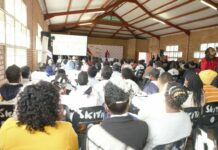![Marikana 2nd Anniversary Ihsaan Hendricks [slider]](https://www.thedailyvox.co.za/wp-content/uploads/2015/06/Marikana-2nd-Anniversary-Ihsaan-Hendricks-slider.jpg)
Last weekend’s City Press expose of what are clearly extra-judicial executions at Marikana was simply horrifying.
According to the testimony of one Constable Itumeleng Ntsileng, an officer with the police special task force present at the scene, some mine workers were shot dead even when when they had surrendered and begged for the lives. Another officer said they had been told to “finish them off.”
“We were instructed to finish them off. I don’t know why, but it was a command, and we were trained to obey commands and not ask questions,” the other officer under the pseudonym Lesego told City Press.
Those who have followed the events that led to the tragedy at Marikana a small mining town in South Africa, where 34 miners were shot down by police in 2012, or its aftermath, including Farlam Commission Report, wouldn’t be altogether surprised by the veracity of the accounts reported in the press.
Marikana was a massacre. Business and government collaborated and had their foot soldiers commit despicable murders. Of this, we have little doubt. And that there was little to no fall-out in government or at Lonmin (the mining company) for the events at Marikana suggests that this was a story packed into a casket for another day.
The question now is: is it time for the ghosts of Marikana to rise?
Surely it cannot be coincidence that in the middle of the most tumultuous week of South African politics this story, revealing police brutality at Marikana, is released?
Of course, the report doesn’t name Cyril Ramaphosa, the new president of the African National Congress.
But in the public imagination, Marikana is tied to Ramaphosa (a director at Lonmin at the time, who described the miners as criminals and asked for concomitant action to be taken) in quite the same way Nkandla scandal has always been tied to Zuma. Though Ramaphosa was found to have done no wrong, the new testimonies given in the City Press make it seem that the findings of the Commission might be lacking. By implication, Ramaphosa might have apologised, but is no longer out of the woods.
Too poisonous for the broth
It’s no secret that the ANC’s top leadership’s battle to convince Zuma to step down is emblematic of a party churning with complicity. Zuma has merely become too poisonous for the broth. When decade-long sycophants suddenly say “you have to go”, it’s only natural that the boss would want to take them with him.
A little history would help.
In 2009, the ANC voted in a man who sold himself as “the people’s candidate” but was actually a tremendous fraud. He had a history of anti-apartheid activism, of sacrifice and political acumen, but he was not the president South Africa needed.
If the rape trial of 2006 didn’t merely paint him out to be a misogynist, the treatment of Khwezi, as the survivor was known (she was chased out the country) signalled of a fascism to come.
The public’s abhorrence for the former President Thabo Mbeki cut so deep that the working class were willing to be put their lives on the line for a man who offered nothing more than speaking simply and acting with humility.
Nevermind the hundreds of dubious payments from Zuma associate Schabir Shaik and the endless talk of racketeering.
After Zuma was elected, the entire national debate revolved around getting him out of office, with tragic interludes, including load-shedding, the 2010 World Cup, the Marikana massacre and the Life Esidimeni catastrophe.
So much so, that the Democratic Alliance and the Economic Freedom Fighters (itself a bastard child, born out of discontent with Zuma) have focused primarily on Zuma for the past five years. What else have these parties done besides haggle Zuma in parliament?
Outside parliament, the DA is in shambles; their crown jewel Cape Town is about to turn into a desert, their Mayor has hired an EFF advocate to fight her internal battles and their former leader spends her time defending colonialism on Twitter.
The EFF has its own problems. For months there have been rumours of divisions and schisms within the party. According to a new report released by the Institute of Race Relations (written by Gareth van Onselen), 61% of all EFF parliamentarians have resigned or been expelled since the 2014 election, more than any other party. The EFF, for all its good ideas, have become arrogant, drunk on their diplomas and degrees. They’re unable to deal with criticism and have become increasingly rude to questions; this is often a tell-tale sign of a party battling demons.
I have to wonder if we are moving towards another era of mudslinging in parliament? It’s certainly already started. The DA has already asked the Independent Police Investigative Directorate and the National Prosecuting Authority if the new information on Marikana will be used going forward. Specifically, they want to know who gave these orders to kill. Meanwhile, the South African Federation of Trade Unions (SAFTU) are calling for fresh investigations.
We know that if and when Ramaphosa takes over, the DA and EFF are going to lay into him, focusing on Marikana, his relationship with big business (the EFF’s forte) and perhaps something about that R19 million buffalo and calf.
South Africans just want to know when someone is going to get on with the job of governing the nation.








